- Markets, finance and governance
- Cities (planning, implementation, and management processes)
- Tamil Nadu Urban Sanitation Support Programme - Studies and Assessments in several cities in Tamil Nadu, India
Tamil Nadu Urban Sanitation Support Programme - Studies and Assessments in several cities in Tamil Nadu, India
66.4k views
++++++++++
Purpose
To strengthen institutional capacities for promoting inclusive sanitation.
Activities
To demonstrate measurable improvements along the entire urban sanitation chain in Tamil Nadu, and strengthen institutional capacities for promoting inclusive sanitation with a focus on improved access for the urban poor.
The key activities carried out in this phase of the programme are:
1. Technical Assistance to ULBs/ Regional Entities
2. Improvement in Sanitation Treatment Facilities
3. Model for Promoting Regulated De-sludging
4. Leveraging Resources and Influencing Schemes and Projects
5. Capacity Building
6. Knowledge Management and Peer-to-Peer Learning
7. Community Engagement
8. Gender Mainstreaming
9. Behaviour Change and Communication
10. Improvement of Public and Community Toilets
11. Improvement of Occupational Conditions of Sanitation Workers
12. Enabling Environment and Governance
Objectives
The long term vision of this programme is that urban Tamil Nadu will be poised to becoming a fully sanitised and healthy state, substantially eliminating open defecation, achieving improvements in services through the entire sanitation value chain, and able to safely dispose an increasing proportion of its human excreta, and re-use/ recover resources therefrom.
Further information
In the first phase (2015-2017), the programme sought to establish two model towns in Tamil Nadu as well as create an enabling approach for state-wide scale up. A two-pronged approach of focusing on two model urban locations to demonstrate on-ground city-wide sanitation transformation, while simultaneously creating a state-wide enabling environment, for the roll-out and scaling-up of innovations later on was adopted. The programme, created as a Technical Support Unit (TSU), worked closely with the Government of Tamil Nadu, and established an Advisory Committee (AC), headed by the Principal Secretary, and including representatives of the Gates Foundation (BMGF), to enable efficient co-ordination and faster approvals for the programme.
This second phase will build on the achievements of the first phase. Instead of taking up a selected number of ULBs for implementation support in an incremental manner, this phase will adopt the approach of state-wide scaling-up and demand-based advisory support to ULBs.
This work is funded by the Bill & Melinda Gates Foundation with a grant of US$ 3,617,559.
For further information please see: www.tnussp.co.in
Link to SuSanA project database: www.susana.org/en/knowledge-hub/projects/database/details/575
Please Log in to join the conversation.
You need to login to replyRe: Scoping Exercise to Support Sustainable Urban Sanitation in Tamil Nadu: Exposure Visit Report
Please log in or register to see it.
This message has an attachment file.
Please log in or register to see it.
Please Log in to join the conversation.
You need to login to replyRe: TNUSSP -Scoping Exercise to Support Sustainable Urban Sanitation in Tamil Nadu: Primary Study Report – Vol I & II
This message has attachments files.
Please log in or register to see it.
Please Log in to join the conversation.
You need to login to replyRe: Scoping Exercise to Support Sustainable Urban Sanitation in Tamil Nadu: Secondary Review - Draft Report
The first in the series of reports is the secondary review of urban sanitation in Tamil Nadu. This review provides a situational analysis of water and sanitation in urban areas of the State of Tamil Nadu, India. This study draws mainly from available secondary literature and data from the government and other public sources. The report also has details on the legal and institutional framework, the administrative structure of urban governance, and an analysis of the State finances, and the finances of the Urban Local Bodies (ULBs) in Tamil Nadu.
Please log in or register to see it.
This message has an attachment file.
Please log in or register to see it.
Please Log in to join the conversation.
You need to login to replyThe Tamil Nadu Urban Sanitation Support Programme (TNUSSP), which works in the South Indian State of Tamil Nadu, observed the World Toilet Day with celebrations in three of its project sites – Tiruchirappalli, a tier-2 city and a cluster of two smaller towns Periyanaicken-palayam and Narasimhanaicken-palayam.
As part of the daylong celebrations, a Social and Behaviour Change Communication (SBCC) campaign was organised in the three locations. This included a travelling musical film on the full cycle of sanitation, public outreach programmes, release of communication material and pop quiz competitions.
A formal event was organised by the local government in Tiruchirappalli, while government officials along with the project staff flagged off a rally in Periyanaicken-palayam. The question ‘where does your poo go?’ was at the heart of the campaign and messages on safe handling and safe disposal of fecal matter were repeatedly broadcast to the public. The local media as well as the radio stations were roped into the programme and were effectively used to spread the message of safe sanitation and its impact on public health.
The campaign raised the curiosity of the public in the three locations who had not engaged with the question of what happens after one flushes the toilet, and helped in mitigating the sense of shame and disgust that is traditionally associated with issues around sanitation. The campaign also gave an insight to the project staff on the importance of dealing with different sections of stakeholders and making communication campaigns interesting and accessible to the target population. It also showed that positive messaging – in this case linking public health to safe sanitation – works better as a tool of motivation and follow-up action and goes a long way in creating an enabling environment which can facilitate behaviour change.
Attachments:
-
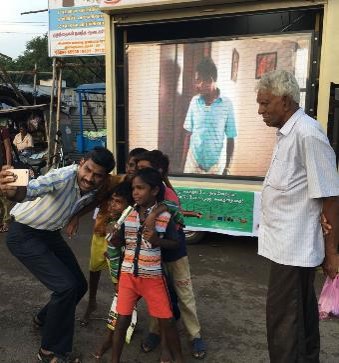 Engagement...dren.jpg
(Filesize: 43KB)
Engagement...dren.jpg
(Filesize: 43KB)
-
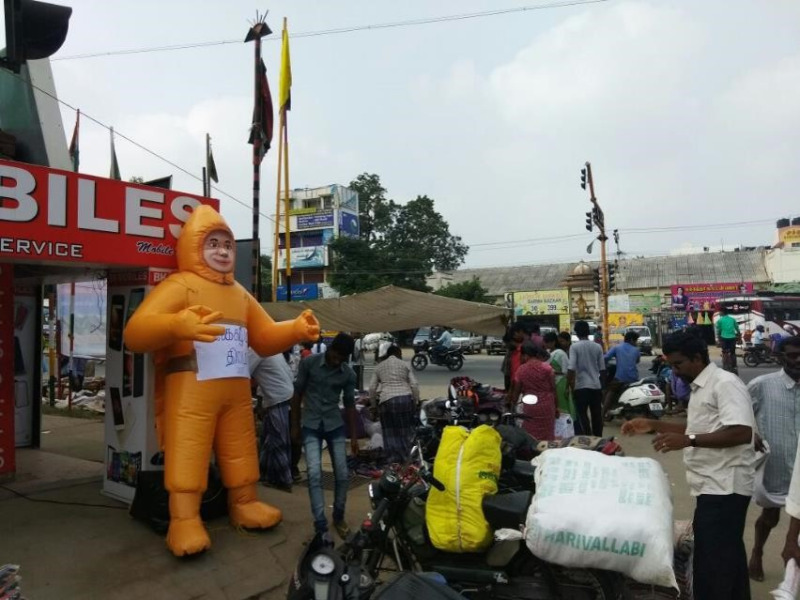 Filmmascot.jpg
(Filesize: 134KB)
Filmmascot.jpg
(Filesize: 134KB)
-
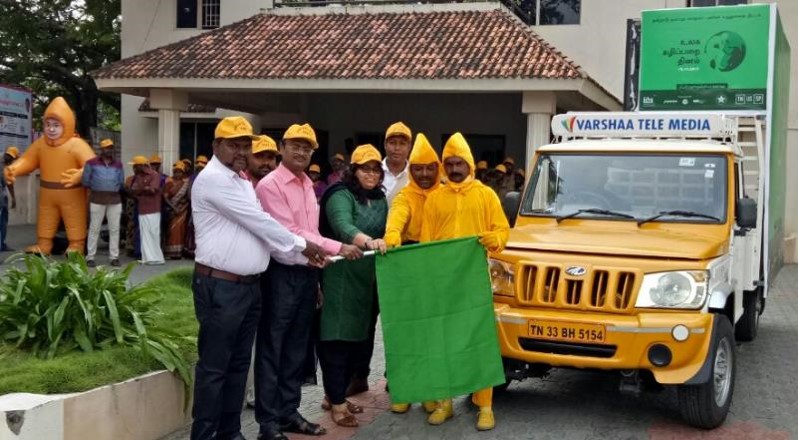 Rallyflagg...tore.jpg
(Filesize: 103KB)
Rallyflagg...tore.jpg
(Filesize: 103KB)
-
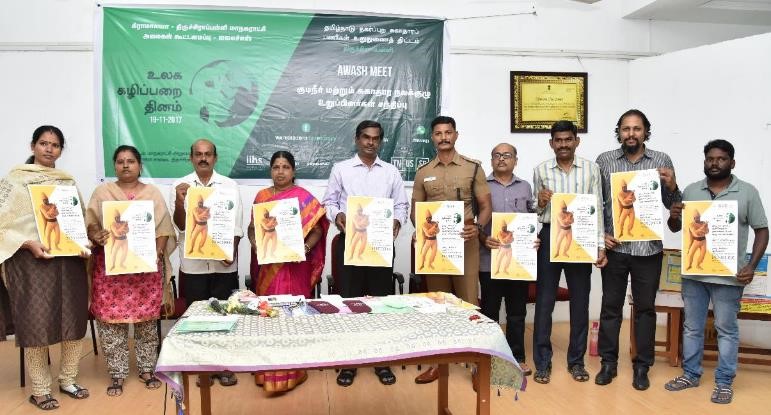 Releaseofp...ichy.jpg
(Filesize: 96KB)
Releaseofp...ichy.jpg
(Filesize: 96KB)
-
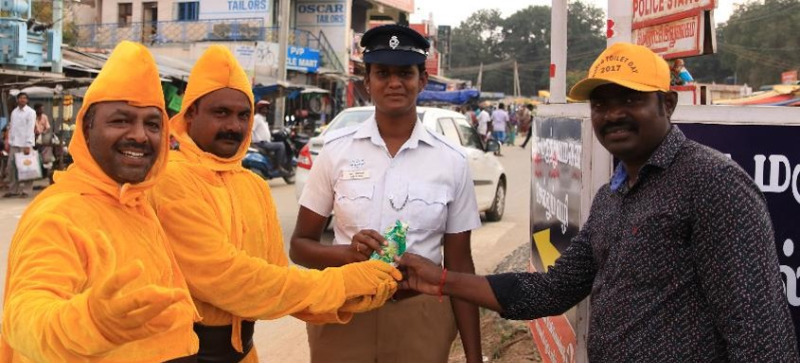 Prizedistr...1-31.jpg
(Filesize: 120KB)
Prizedistr...1-31.jpg
(Filesize: 120KB)
Please Log in to join the conversation.
You need to login to replyRe: Tamil Nadu Urban Sanitation Support Programme (TNUSSP) - Practice Briefs
TNUSSP PRACTICE BRIEF #1: Legal and Institutional Arrangements for Sanitation in Tamil Nadu - In order to achieve 100% sanitation and improve the public health outcomes in urban Tamil Nadu, TNUSSP undertook a legal, regulatory and institutional review across the sanitation value chain. This review mapped the institutional arrangements, laws, and regulations that govern sanitation in the State. Our findings show that the current legal and institutional arrangements take a technocratic view of the challenges in the full cycle of sanitation rather than a public health approach where the State is the ultimate custodian of ensuring environmental sanitation.
This practice brief, provides a summary of this review along with the key areas of improvement, and a road map to achieve 100% safe sanitation and improved public health outcomes.
TNUSSP PRACTICE BRIEF #2: Capacity Building for FSM in Tamil Nadu - Capacity building has come to occupy a pivotal position in the water supply and sanitation sector, as a means to achieving overall improvements. At present, the public sector and more specifically the sanitation sector in India today, is fraught with i) poor domain knowledge and capacity; ii) lack of established precedence for implementation of operational procedures by government agencies; and iii) lack of systems for orientation and incentives to implement positive changes such as enforcing the full-cycle of sanitation from containment to disposal/re-use on a regular basis instead of engaging in a one-time campaign on sanitation.
This practice brief, provides TNUSSP’s multi-pronged approach towards addressing the capacity building gaps along the full cycle of sanitation. Findings from our Training Needs Assessment of Masons and ULB officers, and capacity building efforts such as the domestic and international exposure visits, and orientation programmes for officers and de-sludging operators are also discussed in detail.
TNUSSP PRACTICE BRIEF #3: A Behaviour Change Communication Strategy - In Tamil Nadu, currently, a range of behaviour deficits exist along the full cycle of sanitation, at the stages of capture, containment, emptying, transport and re-use/disposal. However, communication strategies in the sanitation sector have been largely limited to promoting hygiene behaviours such as handwashing or stopping open defecation by promoting the use of toilets. While these efforts are important, there are several other behaviour modifications along the full cycle of sanitation that need similar, if not more attention.
This practice brief, summarises TNUSSPs Behaviour Change Communication (BCC) strategy, consisting of campaigns, events and materials to address multiple behaviour deficits along the sanitation value chain. The strategy has been conceptualised to include segmentation and targeting of those who tend to embrace changes and newness (innovators and early adopters), evoke the benefits of new behaviour and the cost of current unsanitary practices, as well as promote a positive, aspirational position to evoke adoption of the ‘new way’.
This message has attachments files.
Please log in or register to see it.
Please Log in to join the conversation.
You need to login to replyRe: Tamil Nadu Urban Sanitation Support Programme (TNUSSP) -Technical Support Unit
Thank you for your interest in the TNUSSP. I have attached our brochure and programme leaftlets that provide the latest updates on the activities that we have been engaged with. We will be happy to answer any specific questions or queries.
Regards
Harini
This message has attachments files.
Please log in or register to see it.
Please Log in to join the conversation.
You need to login to reply- Elisabeth
-
- User is blocked
- Freelance consultant since 2012
Less- Posts: 3372
- Karma: 54
- Likes received: 932
Re: Tamil Nadu Urban Sanitation Support Programme (TNUSSP) -Technical Support Unit
Thanks for introducing this interesting project to us here on the Forum!
I looked it up a bit further and updated its entry in SuSanA's project database which now looks like this:
www.susana.org/en/resources/projects/details/295
I saw that the grant size by the Gates Foundation is close to 5 million USD. This sounds like a lot, although if you are doing full-scale implementation in two cities then it's not so much.
You told us that:
"The programme is being implemented in Trichy and two town panchayats in Coimbatore – Periyanaicken-Palayam (PNP) and Narasimhanaicken-Palayam (NNP), that represent the two most significant typologies in the State for scaling up – the first, a large city that is partially sewered; and the latter, a cluster of smaller town panchayats.
In both locations, the programme is implementing projects and interventions along the full sanitation cycle, and city sanitation and investment plans are being prepared, in consultation with all stakeholders."
Could you give us an update on the current status (the project started October 2015)? What are the main achievements so far? What are the main frustrations?
Which technologies are you looking at? Since CDD is one of the partners, I am expecting to see some DEWATS-type wastewater treatment systems...
Regards,
Elisabeth
Freelance consultant on environmental and climate projects
Please Log in to join the conversation.
You need to login to replyTamil Nadu Urban Sanitation Support Programme (TNUSSP) -Technical Support Unit
Background
Lack of adequate sanitation poses one of the greatest barriers for Tamil Nadu in achieving her full development potential, and ensuring high standards of public health for her citizens. While sewerage and treatment plants have received policy attention and investments in larger cities of the State, on-site systems that are the predominant household arrangements across the State, have received limited attention.
The Govt. of Tamil Nadu (GoTN) has been a pioneer in the sanitation sector by not only recognising the importance of full sanitation coverage as core to improved standards of public health, but has also prioritised the full sanitation chain, including the strengthening of septage management as an economical and sustainable complement to network-based sewerage systems. The State articulated the need to address total sanitation, and the “Namma Toilet” (“Our Own Toilet”) or Public Toilets were rolled out in urban areas in 2013. The GoTN was also the first Indian State to issue the Septage Management Operative Guidelines in September 2014.
About TNUSSP
In order to achieve the Sanitation Mission of Tamil Nadu, the Bill and Melinda Gates Foundation (BMGF) is supporting the GoTN by setting up a Technical Support Unit (TSU) within the Municipal Administration and Water Supply (MAWS) Department. The TSU implements the TNUSSP, a state-wide programme to make improvements along the entire urban sanitation chain in their planning, implementation and monitoring processes in Tamil Nadu. An Advisory Committee in MAWS Department guides the TSU, that works closely with State Agencies, ULBs, private enterprise and communities, to enable considerable experimentation on ground and testing of innovations especially in two model cities, while assisting State-level scaling up.
Programme Aim and Strategy
The TNUSSP supports the sanitation mission of the State by effecting improvements along the entire urban sanitation value chain in the State of Tamil Nadu, and by demonstrating innovations in two model urban locations.
A two-pronged approach is being adopted, focusing on two model urban locations to demonstrate on-ground city-wide sanitation transformation, while simultaneously creating a state-wide enabling environment, for the roll-out and scaling-up of innovations.
Scope of Programme Implementation
The programme is being implemented in Trichy and two town panchayats in Coimbatore – Periyanaicken-Palayam (PNP) and Narasimhanaicken-Palayam (NNP), that represent the two most significant typologies in the State for scaling up – the first, a large city that is partially sewered; and the latter, a cluster of smaller town panchayats.
In both locations, the programme is implementing projects and interventions along the full sanitation cycle, and city sanitation and investment plans are being prepared, in consultation with all stakeholders.
At the State level, there is substantial work being done towards creation of an enabling environment that across different components listed below.
Focus Areas
The TSU provides support for improved sanitation via the following programme components that are being implemented at the State level in the two model urban locations.
1. Improved Enabling Environment and Governance
2. Engineering and Planning
3. Implementation Support
4. Behaviour Change and Communication
5. Enterprise Development
6. Capacity Building and Training
7. Knowledge Management
8. Monitoring, Learning and Evaluation
The first phase of the programme is for two years (Nov 2015 – Oct 2017).
PARTNERS
TNUSSP is being implemented by a consortium of organisations, led by Indian Institute for Human Settlements (IIHS), and comprising IIHS, Gramalaya, Keystone Foundation, CDD. It is funded by Bill and Melinda Gates Foundation.
Indian Institute for Human Settlements (IIHS)
The Indian Institute for Human Settlements (IIHS) is a national education institution committed to the equitable, sustainable and efficient transformation of Indian settlements. IIHS aims to establish an independently funded and managed National University for Research and Innovation focused on the challenges and opportunities of India’s urban transition. The proposed IIHS University will host an integrated programme of quality campus-based education and research, training and lifelong learning for working professionals, distance and blended learning, as well as a whole array of practice and advisory services. The university will have a strong interdisciplinary orientation bringing together theory and praxis that is grounded in the South Asian context and also engages with and draws from knowledge across the globe.
Consortium for DEWATS Dissemination (CDD) Society
The CDD Society is a non-governmental organisation, started in 2002 and registered formally as not-for-profit society in 2005. The consortium was formed with an agenda to find solutions to the existing sanitation challenges in India. This fulfils the aim of reducing the environmental burden due to pollution as a result of poor sanitation. To deal with untreated sewage, the consortium advocated the use of natural, biological treatment using as set of anaerobic and aerobic treatment technologies. The unique feature of Decentralised Wastewater Treatment Systems (DEWATS) was that it mimicked nature without the intervention of chemicals and mechanical elements.
Gramalaya
Gramalaya is a non-governmental organisation that has been operating in Thottiyam and Thathaiengarpet and Thuraiyur Block in the rural areas and in the slums of Tiruchirappalli City Corporation in Tiruchirappalli District since 1987. Health and hygiene education, promotion of Self Help Groups among rural, urban and tribal women, construction of low-cost latrines and safe water supply through micro-credit are the major activities of Gramalaya. The Government of India has approved Gramalaya as one of the National Key Resource Centres of the Ministry of Drinking Water and Sanitation for providing training to Government officials in Karnataka, Andhra Pradesh and Tamil Nadu.
Keystone Foundation
Keystone Foundation has been working in the Nilgiri Biosphere Reserve (NBR) since 1993 with indigenous communities on eco-development initiatives. During the last couple of years, seven thematic areas have taken form, derived from the original idea of a holistic approach to the issues of livelihoods, conservation and enterprise. There are: Conservation, Livelihoods, Indigenous Peoples Programme, Appropriate Technology, Research, Information and Communication, Knowledge and Capacity Building, Finance and Administration and the Crosscutting Programmes of Pollination, Human-Wildlife Conflict, Water Resources, Health and Nutrition and Environmental Governance.
TSU-TNUSSP
7A, Chaitanya Exotica, 24/51, Venkatnarayana Road, T.Nagar, Chennai 600 017. INDIA.
Phone: +91 44 6630 5500/6555 6590 Email: This email address is being protected from spambots. You need JavaScript enabled to view it.
Attachments:
-
 TNUSSPPart...nner.jpg
(Filesize: 10KB)
TNUSSPPart...nner.jpg
(Filesize: 10KB)
Please Log in to join the conversation.
You need to login to reply- Markets, finance and governance
- Cities (planning, implementation, and management processes)
- Tamil Nadu Urban Sanitation Support Programme - Studies and Assessments in several cities in Tamil Nadu, India







